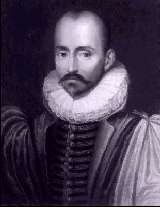
Born: February 28, 1533, in Château de Montaigne near Bordeaux, France
Died: September 13, 1592, in Château de Montaigne near Bordeaux, France
Montaigne was a French courtier, essayist and philosopher who lived during the reign of Charles IX. He was the author of Essais, and the creator of a new literary form, the essay.
Montaigne was the son of Pierre Eyquem and Antoinette de Louppes (Lopez). His mother who was of Spanish-Jewish decent, but had converted to Protestantism, had little influence on his life. Montaigne was carefully educated by his father and baptized a Roman Catholic. He insisted Montaigne be fluent in Latin before the boy learned any French. His father hired a German tutor, who spoke no French, and Montaigne was six before he heard his native language. His father was a wealthy merchant who had purchased a seigneurie in Montaigne and adopted a title of nobility. Montaigne's grandfather, Ramon Eyquem owned the Chateau de Montaigne.
Montaigne attended the College de Guyenne in 1539 in Bordeaux. He was taught by two of the greatest humanist scholars of the day, George Bichanan, and M.A. de Muret. Naturally, he was well read in the ancient humanists including Plutarch. He went on to study law at Toulouse between 1546-1550. Then, he established a practice in Bordeaux in 1557. His best friend during his period at the parliament was Étienne de La Boëtie. La Boëtie died in 1563 and Montaigne published his writings in 1571.
While in Bordeaux he worked with members of the Parliament. Throughout his life he had performed court duties, and diplomatic functions for a number of nobles such as Charles IX, Henry III, and Henry of Navarre. He married François de La Chassaigne in 1565, and they had one child, Léonor, who died in infancy.
His first publication was Theologia naturalis (1569) which his father had asked him to translate into French from Latin. Unfortunately, his father died a year before the work was completed. After his father's death he retired from public office to the castle Montaigne. He installed his huge library in one of the towers and spent much of his time reading and writing there.
He began work of Essais in 1572 and continued the project until his death. It is thought the work began as notes on the books he read, to aid his memory. This practice of compilation of notes was quite common in the medieval period. However, soon his project was more than just note-taking; he was investigating the human condition in his writing. By testing his ideas and experiences in a form never before conceived, he is credited as the father of the essay.
He examined individuals, not because each person is unique, but because he thought he would see the imprint of humanity on the soul of one person. One of his arguments was that man must learn to know himself before he can gain knowledge of others. His work represents the skepticism of the period, for example, his maxim was "Que-je sais?" or "What do I know?"
The first edition of Essais appeared in 1580 containing two volumes. A second edition with three books was published in 1588. The work demonstrates his classical Latin education, and deals with his life and the lives and ideals of the leading figures of the time. It is considered the finest collection of essays about people to that point in history.
Later in life he suffered from an illness which he thought would be fatal so he made what he thought would be his final public tour. He traveled through Germany and Italy in 1580 to 1581, recording his memories in Journal du Voyage. However, he did not die immediately and from 1581 to 1585 he served as mayor of Bordeaux.
In 1588, he traveled to Paris to oversee the publication of Essais. While in Paris he was arrested for his association with Henry of Navarre. He was imprisoned for several hours in the Bastille then released.
Fearing his work would be left unfinished, he adopted Marie de Gournay and she assisted in editing his work, and prepared the edition that was published in 1595. The first translation into English was done by John Florio in 1603. Montaigne was influenced by Shakespeare and the essay style was picked up next by Abraham Cowley in Essays in Verse and Prose in 1668.